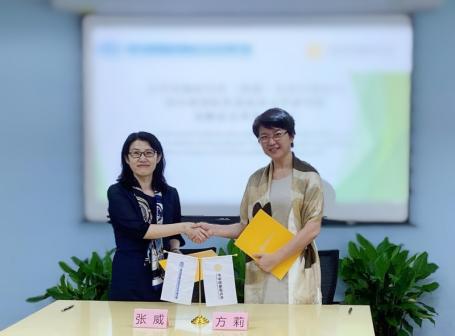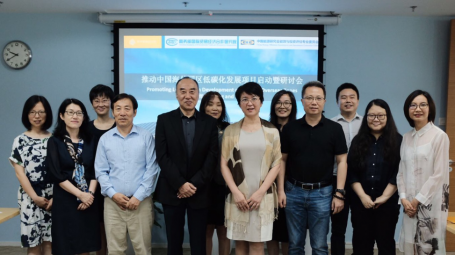Decarbonization of Energy Infrastructures Accelerates the High-Quality Development of China Overseas Zones
Overseas zones are an important carrier for Chinese enterprises' foreign investment as well as a vital area to promote greening energy infrastructure in the Belt and Road Initiative (BRI) countries. With policy frameworks of Chinese overseas zones’ low-carbon development and renewable energy (RE) projects applications in Chinese overseas zones, World Resources Institute (WRI) works closely with Chinese Academy of International Trade and Economic Cooperation (CAITEC) and other partners to launch the “Low-Carbon Development of Chinese Overseas Zones” project. As an important component of the Greening BRI Project supported by the Children’s Investment Fund Foundation(CIFF), it aims to promote Chinese enterprises’ RE investments in BRI countries.
In this regard, WRI held the “Low-Carbon Development of Chinese Overseas Zones” project kick-off meeting and workshop on July 24, where memorandums of understanding (MOUs) with institutions such as the CAITEC were signed.

Dr. FANG Li, Country Director of WRI China, indicated to develop significant participation of China in global governance, China Overseas zones is acting a linkage to facilitate industrial economic and trade cooperation between China and other countries. Under such complex international background of the post-epidemic era, the low-carbon development of China Overseas zones will help promoting the global economic recovery and the value chain reshaping. ZHANG WEI, Vice President of CAITEC, pointed out China Overseas zones has been regarded as instrumentally to promote BRI development and an essential platform of international capacity cooperation, placing a gorgeous branding of to deepen the economic and trade cooperation between China and other countries. MIAO Hong, BRI Program Director of WRI China, presented WRI greening BRI project background and chief goals, sub-objectives, tasks of each sub-project, implementation strategies and key partners.
CAITEC introduced the development status and the best practices of Chinese Overseas Economic and Trade Cooperation Zones (OETZs) and pointed out that Chinese OETZs often faces challenges such as insufficient energy and power supply, difficulty in the financing, and lack of endogenous motivation for low-carbon development in the high-quality development. CAITEC also shared the overall thinking for advancing the low-carbon development of Chinese OETZs. China Energy Efficiency Investment and Assessment Committee of the China Energy Research Society proposed a classification evaluation framework and indicator system for improving the management system of overseas zones, as well as policy recommendations for further promoting low-carbon demonstration and scaling up of overseas zones through standardization, guidance, and benchmarking.
Over 40 experts participated in the workshop, including BAI Rongchun, deputy director of the National Standardization Technical Committee for Energy Fundamental and Management, DAI Yande, executive member of China Energy Research Society and former director of the Energy Research Institute of the National Development and Reform Commission, LI Xiaowen, Division Director of the Policy Research Bureau of the China Banking and Insurance Regulatory Commission, GUO Li, Director of the China South-South Industrial Cooperation Center of the United Nations Industrial Development Organization, ZHAO Kun, Director of the Policy Research Division at the Belt and Road Construction Promotion Center of the National Development and Reform Commission, QI Xin and WU Fang, Director and Deputy Director of the Belt and Road Economic and Trade Cooperation Research Institute of the CAITEC, JIAO Jian, China Energy Efficiency Investment and Assessment Committee of the China Energy Research Society, SHENG Guofei, Director of Investment Promotion Department of China Chamber of Commerce for Import and Export of Machinery and Electronic Products, HE Ping, Industry Program Director of Energy Foundation China, YANG Fuqiang, Senior Advisor of China Program at the Natural Resources Defense Council, GE Chun, Deputy General Manager of the Energy Storage and System Integration Division of Canadian Solar Power Group Co., Ltd, and WU Danmei, Special Assistant to the Chief Executive Officer of the Thai-Chinese Rayong Industrial Park.

Experts discussed the focus of low-carbon development, evaluation methods and tools, supporting mechanisms, and the application prospects of RE in Chinese overseas zones, and put forward the following suggestions:
- Fully identify problems and deeply explore the potentials. Focus on analyzing the energy efficiency level of overseas zones, benchmark with energy efficiency quota standards in China, and pay attention to cascading utilization and comprehensive utilization of energy in zones. RE sources – mainly wind power and solar power are able to be integrated into the grid at an affordable price in most areas around the world, and the cost of energy storage infrastructures is also falling rapidly. It is technically and economically feasible to achieve a high proportion of RE in zones, and the installation conditions of RE facilities need to be considered in the early stage of the zones’ planning.
- Construct an indicator system for low-carbon development in overseas zones and apply the assessment for pilot zones. The development of a low-carbon development indicator system should also consider the differences between host countries, and the evaluation process should pay attention to the concept of systematic and full life cycle and adopt dynamic methods to carry out evaluation and establish a reward and punishment mechanism.
- The low-carbon development of overseas zones also needs the support of modern information technologies and green financial systems. On the one hand, it is necessary to build an intelligent platform to support smart management and improve the green development of the zones. On the other hand, it is also important to establish a green financial support system and encourage domestic and foreign capital investment to support the green development of overseas zones by providing green credits, green bonds, green insurances and other financial instruments.
- While promoting the low-carbon development of overseas zones, it is also necessary to learn from the low-carbon development of domestic zones and summarize valuable experiences and lessons.
LIU Qiang, Director of Programmes, CIFF China Office, attended the workshop and expressed high expectation on the project implementation. He pointed out it would be expected that the research results of the project can be transformed into feasible policy recommendations, which could support the decision-making process of relevant government agencies, and provide concrete solutions for effectively promoting greening of overseas investment and BRI countries’ decarbonization.